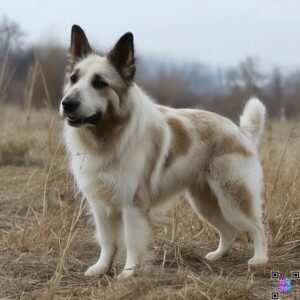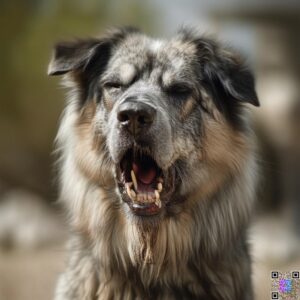🐾 Introduction
The Anatolian Shepherd is a remarkable breed admired for its strength, loyalty, and natural guarding instincts. Originating in Turkey, these dogs have served for centuries as dedicated livestock guardians, protecting herds from predators in harsh and demanding environments. Their reputation for being resilient, intelligent, and fiercely protective makes them a valued companion among experienced dog owners and breeders.
Understanding the life expectancy of the Anatolian Shepherd is essential for both current and prospective owners. By knowing what factors influence their longevity, such as genetics, diet, exercise, and healthcare, you can take proactive steps to help your Anatolian Shepherd live a long, healthy, and fulfilling life. In this article, we’ll explore the typical lifespan of the breed and the key elements that impact it—from common health conditions and nutritional needs to exercise routines and preventive care strategies.
Whether you’re planning to adopt an Anatolian Shepherd or already share your life with one, this guide will provide valuable insights to support the well-being and longevity of this majestic guardian.
Understanding the Anatolian Shepherd History and Origin

The Anatolian Shepherd is a breed with a rich history that dates back over 6,000 years. Originating from the Anatolian region of Turkey, these dogs were bred to protect livestock from predators such as wolves and bears. Their impressive size and strength made them ideal guardians for nomadic shepherds. Today, they continue to serve as working dogs on farms and ranches, showcasing their natural protective instincts and intelligence.
🐕 Physical Characteristics
The Anatolian Shepherd is an impressively large and powerful breed, originally built for endurance and strength in harsh working environments. Males typically weigh between 110 to 150 pounds (50–68 kg), while females range from 80 to 120 pounds (36–54 kg). In terms of height, these dogs stand tall—26 to 29 inches (66–74 cm) at the shoulder—giving them a commanding presence.
Their thick double coat provides protection against extreme weather and can vary in length from short to medium. Coat colors are diverse and include fawn, brindle, white, cream, pinto, and gray, often accompanied by a distinctive black mask. Their broad head, muscular frame, deep chest, and strong jaw further emphasize their role as a serious working and guardian dog.
In addition to their physical strength, Anatolian Shepherds possess keen eyesight and acute hearing, making them naturally alert and effective watchdogs. However, due to their size and intensity, they require consistent training and early socialization to become well-adjusted family companions. With proper care, they are not only formidable protectors but also gentle giants within their trusted circles.
🕒 Life Expectancy of the Anatolian Shepherd
📊 Average Lifespan
The average lifespan of an Anatolian Shepherd ranges between 11 to 13 years, which is relatively standard for a large breed. With proper care, some Anatolians have been known to live up to 14 or even 15 years. Their longevity is a testament to the breed’s natural hardiness, but like all large dogs, they are still prone to specific age-related health issues that can affect quality of life in their senior years.
⚙️ Factors Influencing Lifespan
Several key factors influence the lifespan of an Anatolian Shepherd, and understanding these can help owners extend their dog’s healthy years:
🧬 1. Genetics
-
Lineage plays a significant role in determining overall health and life expectancy.
-
Reputable breeders screen for hip dysplasia, thyroid disorders, and eye conditions to reduce inherited issues.
🥗 2. Diet and Nutrition
-
A balanced, high-quality diet tailored to large breeds is essential for maintaining a healthy weight and supporting joint and heart health.
-
Supplements like glucosamine, omega-3 fatty acids, and probiotics can also aid long-term well-being.
🏃♂️ 3. Exercise and Weight Management
-
Regular exercise helps maintain muscle tone and healthy joints, while also preventing obesity—a leading cause of reduced lifespan in large dogs.
-
Activities should be appropriate to their age and physical condition.
🩺 4. Preventive Veterinary Care
-
Routine vet check-ups, including blood work, dental care, and screening for breed-specific issues, can detect problems early.
-
Vaccinations, flea/tick control, and heartworm prevention also contribute to long-term health.
🧠 5. Mental Well-Being
-
Mental stimulation through training, puzzle toys, and purpose-driven tasks (like guarding or patrolling) supports cognitive health, especially in older dogs.
-
Dogs that remain mentally active often show fewer signs of anxiety and cognitive decline with age.
Health Considerations Common Health Issues
While Anatolian Shepherds are generally healthy dogs, they are prone to certain health issues, particularly as they age. Some common concerns include hip and elbow dysplasia, osteochondritis dissecans, and certain autoimmune conditions. Regular veterinary visits and preventive care can help manage these risks and maintain your dog’s health.
Anatolian Shepherds are generally robust dogs but are prone to certain health issues. Common concerns include hip dysplasia, bloat (gastric torsion), and various skin conditions. Understanding these potential problems is vital for any owner looking to enhance their dog’s life expectancy.
Preventive care is essential. Regular veterinary visits can help catch any developing issues before they become serious. Vaccinations, parasite control, and dental care are all critical components of maintaining your dog’s health. Additionally, being aware of the signs of common ailments can empower owners to seek timely medical attention.
🩺 Preventative Care for Anatolian Shepherds
Preventative care plays a vital role in extending the lifespan and enhancing the quality of life for Anatolian Shepherd dogs. Being proactive with health management not only helps prevent serious illnesses but also ensures your dog stays active, comfortable, and happy as they age.
🔄 Key Components of Preventative Care:
💉 1. Routine Veterinary Visits
-
Schedule annual or biannual check-ups to monitor your dog’s overall health.
-
Early detection of conditions like hip dysplasia, hypothyroidism, or heart issues can lead to more effective treatment.
-
Include blood tests and physical exams as part of regular screenings, especially in senior dogs.
🐛 2. Parasite Control
-
Use monthly flea, tick, and heartworm preventatives to guard against common parasites.
-
Check for ticks regularly if your dog spends a lot of time outdoors.
-
Parasites can lead to serious diseases and secondary infections if not treated early.
🦷 3. Dental Care
-
Maintain oral hygiene through regular brushing and dental chews.
-
Schedule professional cleanings as recommended by your vet.
-
Poor dental health can lead to gum disease, infections, and even impact the heart and kidneys over time.
⚖️ 4. Weight Management
-
Keep your Anatolian Shepherd at an ideal weight to prevent joint stress, diabetes, and cardiovascular issues.
-
Use a portion-controlled feeding schedule rather than free-feeding.
-
Choose large-breed formulas with balanced nutrients, including joint-supporting ingredients.
🏃♂️ 5. Exercise and Mental Stimulation
-
Provide daily walks, space to roam, and guardian-based activities to keep them fit.
-
Mental challenges, such as puzzle toys or scent work, reduce stress and cognitive decline.
🐾 Pro Tip: Preventative care is most effective when started early and maintained consistently throughout your dog’s life. A little planning today can add years of vitality tomorrow.
Diet and Nutrition Dietary Needs
Anatolian Shepherds require a balanced diet tailored to their size and activity level. High-quality commercial dog food formulated for large breeds is often recommended. It’s essential to monitor their food intake and adjust portions based on their age, weight, and activity level to prevent obesity. Importance of Nutrition for Longevity Proper nutrition plays a vital role in the overall health and longevity of your Anatolian Shepherd. A diet rich in essential nutrients, vitamins, and minerals supports their immune system, promotes healthy joints, and maintains a shiny coat. Consulting with a veterinarian can help you choose the best diet for your dog’s specific needs.
Exercise and Lifestyle Daily Exercise Requirements
Anatolian Shepherds are active dogs that require regular exercise to stay healthy and happy. Daily walks, playtime, and opportunities to roam in a secure area are essential for their physical and mental well-being. Engaging in various activities helps burn off excess energy and keeps them mentally stimulated .Impact of Activity on Lifespan Regular exercise not only helps maintain a healthy weight but also contributes to a longer lifespan. Active dogs tend to have better cardiovascular health and are less prone to obesity-related issues. Incorporating a mix of physical activities, such as hiking or swimming, can enhance your dog’s overall fitness and longevity,
Here’s a refined and SEO-optimized version of your “Training and Socialization” section, formatted with clear subheadings and bullet points for readability and engagement:
🎓 Training and Socialization for Anatolian Shepherds
Proper training and early socialization are essential for raising a well-behaved and balanced Anatolian Shepherd. As a naturally intelligent, independent, and protective breed, they require structured guidance from a young age to ensure they integrate safely and confidently into family life.
🧠 Importance of Early Training
Anatolian Shepherds are strong-willed and highly intelligent, which makes them both capable learners and stubborn decision-makers. Without early training, they may develop dominant or overly territorial behavior.
✅ Key Benefits of Early Training:
- Establishes clear boundaries and expectations
- Encourages respectful behavior toward people and other animals
- Builds a trust-based relationship between owner and dog
- Makes routine care (like grooming and vet visits) easier and less stressful
🔑 Training Tips:
- Use positive reinforcement methods (treats, praise, toys)
- Avoid harsh corrections—firm but gentle leadership works best
- Begin basic commands (sit, stay, come, leave it) by 8–10 weeks old
- Stay consistent and patient; this breed needs time to trust and comply
🤝 Socialization Techniques
Early and ongoing socialization is just as important as obedience training. Anatolian Shepherds are naturally suspicious of strangers and may react protectively if not properly socialized.
✅ Key Socialization Goals:
- Reduce fear-based aggression or reactivity
- Teach the dog to stay calm and confident in new situations
- Help them coexist peacefully with other pets and children
🐾 Effective Socialization Methods:
- Introduce them to varied environments: parks, vet offices, sidewalks, busy streets
- Arrange safe interactions with people of different ages and appearances
- Provide supervised playtime with other dogs of different sizes and temperaments
- Use controlled exposure to common noises (cars, vacuums, doorbells)
📅 Best Time to Start: Between 8 and 16 weeks of age, when puppies are most receptive to new experiences. However, socialization should continue throughout adulthood.
🐕 Pro Tip: Enrolling your Anatolian Shepherd in a puppy socialization class can jumpstart their learning and help prevent fear-based behaviors later in life.
Would you like to follow this with a section on behavioral challenges and solutions specific to Anatolian Shepherds?
Genetics and Breeding Practices
Genetics also plays a significant role in determining the lifespan of an Anatolian Shepherd. Responsible breeding practices can minimize hereditary health issues commonly found in the breed. Potential owners should seek reputable breeders who prioritize health testing for common genetic disorders. By choosing a dog from a responsible breeder who conducts thorough health screenings, owners can increase the likelihood that their dog will lead a long and healthy life.
Aging Process in Anatolian Shepherds
As with all breeds, aging brings about changes that require special attention from owners. Signs that an Anatolian Shepherd may be aging include decreased energy levels, changes in appetite, or difficulty with mobility. Recognizing these signs early allows owners to adjust care routines accordingly.Caring for senior dogs may involve modifying exercise regimens to accommodate their changing capabilities or providing joint supplements as recommended by veterinarians. Ensuring comfort during their golden years is essential for maintaining quality of life.
Caring for Senior Anatolian Shepherds Signs of Aging
As your Anatolian Shepherd ages, you may notice changes in their behavior and physical condition. Common signs of aging include decreased energy levels, stiffness, and changes in appetite. Paying attention to these signs can help you adjust their care and ensure they remain comfortable and happy. Adjusting Care for Older Dogs Caring for a senior Anatolian Shepherd may require some adjustments to their routine. Providing softer bedding, regular vet check-ups, and modifying exercise routines can help accommodate their changing needs. It’s essential to keep their weight in check and maintain a balanced diet to support their health in their golden years.
Factors Affecting Lifespan:
- Health Care: Regular veterinary check-ups, vaccinations, and preventive care can help extend an Anatolian Shepherd’s life and address health issues early on.
- Diet: A balanced and high-quality diet tailored to their size and age is essential to maintain health and longevity.
- Exercise and Activity: While Anatolian Shepherds do not require excessive exercise, they need regular physical activity and mental stimulation to stay healthy and avoid obesity or joint issues.
- Genetics: Like any breed, some Anatolian Shepherds may be prone to specific health issues that can affect their lifespan, such as hip dysplasia, elbow dysplasia, or bloat.
- Living Environment: Anatolian Shepherds thrive in homes where they have space to roam and protect, such as large yards or rural environments. Dogs that are kept in environments where they are stressed or don’t get enough exercise may face health issues that could reduce their life expectancy.

FAQs
1- What is the average lifespan of an Anatolian Shepherd?
The average lifespan of an Anatolian Shepherd is typically between 11 to 13 years.
2- How can I improve my Anatolian Shepherd’s lifespan?
To improve your Anatolian Shepherd’s lifespan, focus on a balanced diet, regular exercise, routine veterinary care, and preventive health measures.
3- Are Anatolian Shepherds prone to specific health issues?
Yes, Anatolian Shepherds can be prone to health issues such as hip and elbow dysplasia, osteochondritis dissecans, and certain autoimmune conditions.
4- What kind of diet is best for an Anatolian Shepherd?
A high-quality commercial dog food formulated for large breeds is recommended, tailored to their size, age, and activity level.
5- How much exercise does an Anatolian Shepherd need?
Anatolian Shepherds require daily exercise, including walks and playtime, to maintain their physical and mental well-being.
6- How do I care for an aging Anatolian Shepherd?
Caring for an aging Anatolian Shepherd involves monitoring their health, adjusting their diet and exercise routine, and providing comfort as they age.
Conclusion
Understanding the life expectancy of Anatolian Shepherd dogs is vital for providing the best care possible. By focusing on their health, nutrition, exercise, and training, you can help ensure that your furry friend enjoys a long, happy, and healthy life. With proper attention and care, your Anatolian Shepherd can become a cherished member of your family for many years to come.

